“You can’t write poems about the trees when the woods are full of policemen.”
…………………………………………………………………………………… —Bertolt Brecht
Broken Ghazal for Walter Scott
A video looping like a dirge on repeat, my soul—a psalm of bullets in my back.
I see you running, then drop, heavy hunted like prey with eight shots in the back.
Again, in my Facebook feed another black man dead, another fist in my throat.
You: prostrate on the green grass, handcuffed with your hands tied to your back.
Praises for the video, to the witness & his recording thumb, praises to YouTube
for taking the blindfold off Lady Justice, dipping her scales down with old weight
of strange fruit, to American eyeballs blinking & chewing the 24-hour news cycle:
another black body, another white cop. But let us go back to the broken tail light,
let’s find a man behind on his child support, let’s become his children, let’s call him
Papa. Let us chant Papa don’t run! Stay, stay back! Stay here with us. But Tiana—
you have got to stop watching this video. Walter is gone & he is not your daddy,
another story will come to your feed, stay back. But whisper—stay, once more,
with the denied breath of his absent CPR, praise his mother strumming Santana
with tiny hallelujahs up & down the harp of his back. Praise his mother hugging
the man who made her son a viral hit, a rerun to watch him die ad infintum, again
we go back, click replay at any moment. A video looping like a dirge on repeat—
by Tianna Clark
from I Can’t Talk About the Trees Without the Blood
University of Pittsburgh Press, 2018
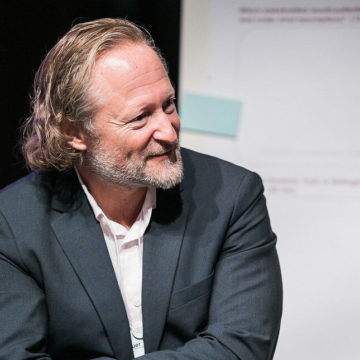 Complexity scientists have been able to make an impressive amount of progress despite the fact that there is not universal agreement about what “complexity” actually is. We know it when we see it, perhaps, but there are a number of aspects to the phenomenon, and different researchers will naturally focus on their favorites. Today’s guest, David Krakauer, is president of the Santa Fe Institute and a longtime researcher in complexity. He points the finger at the concept of agency. A ball rolling down a hill just mindlessly obeys equations of motion, but a complex system gathers information and uses it to adapt. We talk about what that means and how to think about the current state of complexity science.
Complexity scientists have been able to make an impressive amount of progress despite the fact that there is not universal agreement about what “complexity” actually is. We know it when we see it, perhaps, but there are a number of aspects to the phenomenon, and different researchers will naturally focus on their favorites. Today’s guest, David Krakauer, is president of the Santa Fe Institute and a longtime researcher in complexity. He points the finger at the concept of agency. A ball rolling down a hill just mindlessly obeys equations of motion, but a complex system gathers information and uses it to adapt. We talk about what that means and how to think about the current state of complexity science.
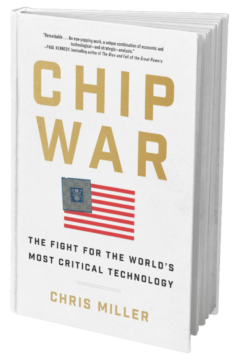 The struggle to control the semiconductor industry is one of the most important economic stories in the world today. Whether China can wrest dominance of semiconductors away from the U.S. and its democratic allies, as it has so many other high-tech industries, will go a long way toward determining the military balance of power this century. And the best book you can read to familiarize yourself with the basics of this titanic struggle is
The struggle to control the semiconductor industry is one of the most important economic stories in the world today. Whether China can wrest dominance of semiconductors away from the U.S. and its democratic allies, as it has so many other high-tech industries, will go a long way toward determining the military balance of power this century. And the best book you can read to familiarize yourself with the basics of this titanic struggle is  For six decades,
For six decades,  THE PURPOSE OF VESTIBULAR THERAPY
THE PURPOSE OF VESTIBULAR THERAPY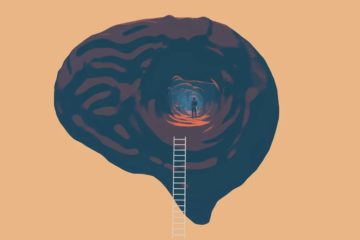 In 1998, at the conference of the Association for the Scientific Study of Consciousness (ASSC), the neuroscientist Christof Koch made a bet with the philosopher David Chalmers: by 2023, science would be able to explain how the brain’s tangle of neurons gives rise to the phenomenon we call consciousness. The winner would get a case of wine. Koch was a professor of cognitive biology who helped pioneer the mechanistic study of the
In 1998, at the conference of the Association for the Scientific Study of Consciousness (ASSC), the neuroscientist Christof Koch made a bet with the philosopher David Chalmers: by 2023, science would be able to explain how the brain’s tangle of neurons gives rise to the phenomenon we call consciousness. The winner would get a case of wine. Koch was a professor of cognitive biology who helped pioneer the mechanistic study of the  Xiulin Ruan, a professor of mechanical engineering at Purdue University, didn’t set out to make it into the Guinness World Records when he began trying to make a new type of paint. He had a loftier goal: to cool down buildings without torching the Earth.
Xiulin Ruan, a professor of mechanical engineering at Purdue University, didn’t set out to make it into the Guinness World Records when he began trying to make a new type of paint. He had a loftier goal: to cool down buildings without torching the Earth.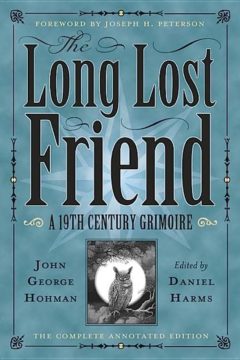 What the old Amish woman named Rachel Smoker and others like her practice is called, depending on whom you ask, powwow or Braucherei or pulling pain or active prayer or witchcraft or folk-cultural religious ritual, though Rachel Smoker would never call it any of these things. She prefers “natural healing” and “reflexology.”
What the old Amish woman named Rachel Smoker and others like her practice is called, depending on whom you ask, powwow or Braucherei or pulling pain or active prayer or witchcraft or folk-cultural religious ritual, though Rachel Smoker would never call it any of these things. She prefers “natural healing” and “reflexology.” How is a totalitarian state like a love affair? They both leave archives behind when they go. How is a totalitarian state like a bad love affair? The archive that survives the end of each is a monument to abuse, surveillance and betrayal.
How is a totalitarian state like a love affair? They both leave archives behind when they go. How is a totalitarian state like a bad love affair? The archive that survives the end of each is a monument to abuse, surveillance and betrayal. For a long time before his death this week at the age of 94, the novelist Milan Kundera seemed to have fallen out of fashion with critics. Jonathan Coe wrote of his “problematic sexual politics” with their “ripples of disquiet.” Alex Preston complained about the “adolescent and posturing” flavour of the books which had thrilled him in his youth, adding of Kundera’s later novels that reading them was an “increasingly laboured process of digging out the occasional gems from the abstraction and tub-thumping philosophising… a series of retreats into mere cleverness.” Diane Johnson of the New York Times seemed to ring the death knell loudest: “what he has to tell us seems to have less relevance… the world has run beyond some of the concerns that still preoccupy him.”
For a long time before his death this week at the age of 94, the novelist Milan Kundera seemed to have fallen out of fashion with critics. Jonathan Coe wrote of his “problematic sexual politics” with their “ripples of disquiet.” Alex Preston complained about the “adolescent and posturing” flavour of the books which had thrilled him in his youth, adding of Kundera’s later novels that reading them was an “increasingly laboured process of digging out the occasional gems from the abstraction and tub-thumping philosophising… a series of retreats into mere cleverness.” Diane Johnson of the New York Times seemed to ring the death knell loudest: “what he has to tell us seems to have less relevance… the world has run beyond some of the concerns that still preoccupy him.”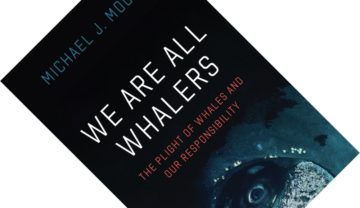 We Are All Whalers is veterinary scientist Michael J. Moore’s account of a life spent studying different whale species and what is killing them. He argues that anyone participating in our global economy has blood on their hands, often without realising it. Readers are warned that this book does not avoid graphic details. His research has ultimately drawn him to the problems of whales getting entangled in fishing gear and being struck by ships. However, it is the path that took him there, through both industrial and subsistence whaling, that might leave some readers more upset.
We Are All Whalers is veterinary scientist Michael J. Moore’s account of a life spent studying different whale species and what is killing them. He argues that anyone participating in our global economy has blood on their hands, often without realising it. Readers are warned that this book does not avoid graphic details. His research has ultimately drawn him to the problems of whales getting entangled in fishing gear and being struck by ships. However, it is the path that took him there, through both industrial and subsistence whaling, that might leave some readers more upset.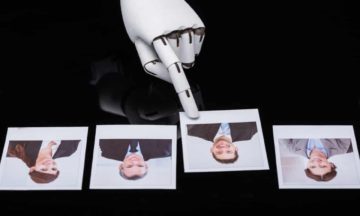 Major economies are on the “cusp of an AI revolution” that could trigger job losses in skilled professions such as law, medicine and finance, according to an influential international organisation.
Major economies are on the “cusp of an AI revolution” that could trigger job losses in skilled professions such as law, medicine and finance, according to an influential international organisation.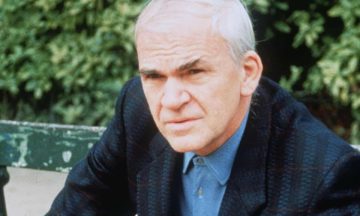 Czech writer
Czech writer 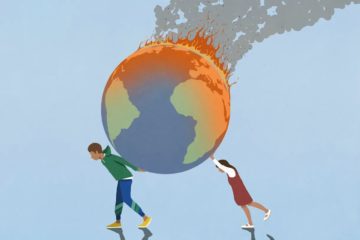 There are a handful of topics that I almost force myself to not think about because the thoughts lead to a dead end. At the top of that list is climate change. It’s one of those problems that starts to overwhelm me when I consider the scale and the implications and all the barriers to tackling it.
There are a handful of topics that I almost force myself to not think about because the thoughts lead to a dead end. At the top of that list is climate change. It’s one of those problems that starts to overwhelm me when I consider the scale and the implications and all the barriers to tackling it.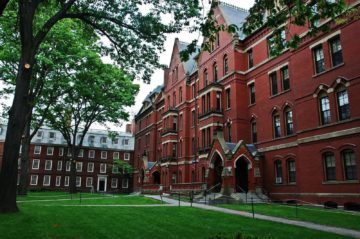 The Maharaja of Whereverstan sends his daughter to Harvard so that she appears meritorious. In exchange, Harvard gets the credibility boost of being the place the Maharaja of Whereverstan sent his daughter. And Harvard’s other students get the advantage of networking with the Princess Of Whereverstan. Twenty years later, when one of them is an oil executive and Whereverstan is handing out oil contracts, she puts in a word with her old college buddy the Princess and gets the deal. It’s obvious what the oil executive has gotten out of this, but what does the Princess get? I think she gets the right to say she went to Harvard, an honor which is known to go mostly to the meritorious.
The Maharaja of Whereverstan sends his daughter to Harvard so that she appears meritorious. In exchange, Harvard gets the credibility boost of being the place the Maharaja of Whereverstan sent his daughter. And Harvard’s other students get the advantage of networking with the Princess Of Whereverstan. Twenty years later, when one of them is an oil executive and Whereverstan is handing out oil contracts, she puts in a word with her old college buddy the Princess and gets the deal. It’s obvious what the oil executive has gotten out of this, but what does the Princess get? I think she gets the right to say she went to Harvard, an honor which is known to go mostly to the meritorious. In hindsight it seems inevitable: a single overarching internet is impossible. The worldviews of people are too fundamentally incompatible at their roots. Or to simplify and put it more bluntly: at least in the United States, there is no way to fit both major political parties onto the same platform and allow them to wield equal power over a perfectly centered Overton window. Blame whichever side you want, red or blue. I’m sure it’s the other side that’s more extreme (and hey, maybe you’re right). But if Twitter was supposed to be the “global town square,” I think Zuckerberg’s so-far successful introduction of its competitor, Threads, which rapidly feels like the other global town square, presages one of the last gasps of the united internet, and the end of an important, if uncomfortable, era. Yes, it was an era of half a billion people crammed into a single echoing room, all our faces smooshed against one another, and all you could taste was the spittle and there was ringing in your ears as the crowd surged. But it was also the time when you could say something and, just occasionally, the entire world would hear it.
In hindsight it seems inevitable: a single overarching internet is impossible. The worldviews of people are too fundamentally incompatible at their roots. Or to simplify and put it more bluntly: at least in the United States, there is no way to fit both major political parties onto the same platform and allow them to wield equal power over a perfectly centered Overton window. Blame whichever side you want, red or blue. I’m sure it’s the other side that’s more extreme (and hey, maybe you’re right). But if Twitter was supposed to be the “global town square,” I think Zuckerberg’s so-far successful introduction of its competitor, Threads, which rapidly feels like the other global town square, presages one of the last gasps of the united internet, and the end of an important, if uncomfortable, era. Yes, it was an era of half a billion people crammed into a single echoing room, all our faces smooshed against one another, and all you could taste was the spittle and there was ringing in your ears as the crowd surged. But it was also the time when you could say something and, just occasionally, the entire world would hear it.